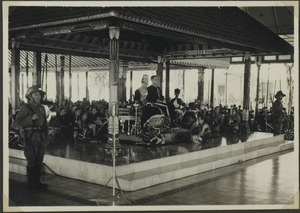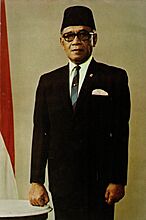Hamengkubuwono IX facts for kids
Quick facts for kids
His Majesty Sri Sultan
Hamengkubuwono IX
|
|
|---|---|
|
ꦲꦩꦼꦁꦏꦸꦨꦸꦮꦤ꧇꧙꧇
|
|
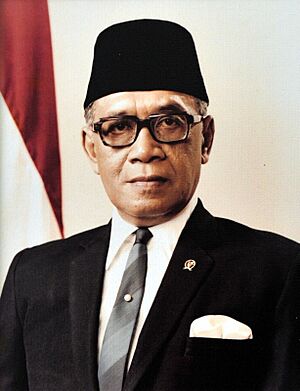
Official portrait, 1973
|
|
| 2nd Vice President of Indonesia | |
| In office 23 March 1973 – 23 March 1978 |
|
| President | Suharto |
| Preceded by | Mohammad Hatta |
| Succeeded by | Adam Malik |
| 1st Chief Minister for Economic and Financial Affairs |
|
| In office 25 July 1966 – 28 March 1973 |
|
| President |
|
| Preceded by | Office established |
| Succeeded by | Widjojo Nitisastro |
| 5th Deputy Prime Minister of Indonesia | |
| In office 6 September 1950 – 27 April 1951 |
|
| President | Sukarno |
| Prime Minister | Mohammad Natsir |
| Preceded by | Abdul Hakim |
| Succeeded by | Suwiryo |
| 3rd Minister of Defense | |
| In office 3 April 1952 – 2 June 1953 |
|
| President | Sukarno |
| Prime Minister | Wilopo |
| Preceded by | Raden Mas Sewaka |
| Succeeded by | Wilopo |
| In office 15 July 1948 – 6 June 1950 |
|
| President | Sukarno |
| Prime Minister | Mohammad Hatta |
| Preceded by |
|
| Succeeded by | Abdul Halim |
| 1st Governor of Yogyakarta | |
| In office 4 March 1950 – 2 October 1988 |
|
| Vice Governor | Paku Alam VIII |
| Preceded by | Office established |
| Succeeded by | Paku Alam VIII |
| 9th Sultan of Yogyakarta | |
| Reign 18 March 1940 – 2 October 1988 |
|
| Preceded by | Hamengkubuwono VIII |
| Succeeded by | Hamengkubuwono X |
| Personal details | |
| Born |
Raden Mas Dorodjatun
12 April 1912 Djokjakarta, Yogyakarta Sultanate, Dutch East Indies |
| Died | 2 October 1988 (aged 76) Washington, D.C., US |
| Resting place | Imogiri Royal Graveyard |
| Political party | Independent |
| Spouses |
|
| Children | 21, including Hamengkubuwono X |
| Parents |
|
| Relatives |
|
| Alma mater | Leiden University |
| Signature |  |
| Military service | |
| Allegiance | Indonesia |
| Branch/service | Indonesian Army |
| Years of service | 1945–1953 |
| Rank | General (titular) |
| Battles/wars |
|
Sri Sultan Hamengkubuwono IX (born 12 April 1912 – died 2 October 1988) was an important Indonesian leader. He was the second Vice President of Indonesia. He was also the ninth Sultan of Yogyakarta and the first governor of the Special Region of Yogyakarta. People knew him as the Father of the Indonesian Scouts.
Contents
Early Life and Education
Growing Up
Born as Gusti Raden Mas Dorodjatun in Yogyakarta, Hamengkubuwono IX was the ninth son of Prince Gusti Pangeran Puruboyo. His father later became Hamengkubuwono VIII. When he was three, he became the Crown Prince of the Yogyakarta Sultanate.
At age four, he went to live with a Dutch family, the Mulders. They called him Henkie, a nickname from Prince Hendrik of the Netherlands.
School Days
He went to school in Yogyakarta, starting with kindergarten. Then he attended elementary school. After that, he went to high school in Semarang and Bandung.
In 1930, he moved to the Netherlands with his older brother. He studied at a high school called Lyceum in Haarlem. People sometimes called him Sultan Henk there. After graduating in 1934, he went to Leiden University. He studied Indology, which was about how the Dutch managed their colonies.
He had to return to Indonesia in 1939 because World War II was starting. He did not finish his university studies.
Back in Indonesia
When he returned to Batavia (now Jakarta) in October 1939, his father met him. During a dinner with the Governor General, his father gave him a special dagger called Kyai Jaka Piturun. This dagger showed that Hamengkubuwono IX was chosen to be the next Sultan.
Soon after, his father became ill and passed away on 22 October 1939. Hamengkubuwono IX gathered his family. They all agreed that he should become the next Sultan.
Becoming Sultan
Hamengkubuwono IX became Sri Sultan Hamengkubuwono IX on 18 March 1940. The Dutch East Indies Government officially crowned him. He received two titles during the ceremony.
In his speech, Hamengkubuwono IX said, "Even though I have tasted Western Education, I am still and will always be a Javanese." This showed his strong connection to his Javanese heritage.
His Time as Sultan
Talking with the Dutch
The 28-year-old Sultan talked with the Dutch governor for four months. They disagreed on a few things:
- The Sultan did not want his prime minister to also work for the Dutch. This would cause a conflict of interest.
- He did not agree that the Dutch should choose half of his advisors.
- He did not want his small army to take direct orders from the Dutch army.
Eventually, the Sultan agreed to the Dutch terms. But in February 1942, the Dutch gave control of Indonesia to the Japanese army.
World War II and Japanese Occupation
In 1942, the Japanese Imperial Army took over Indonesia from the Dutch. Sultan Hamengkubuwono IX was allowed to manage his area under Japanese rule. He worked to protect his people.
The Japanese forced many people to work as laborers, called Rōmusha. The Sultan found a way to stop this. He suggested building an irrigation canal to water rice fields all year. This would increase food production. The Japanese agreed and even helped fund it. This canal was called the Mataram Sewer. Because of the canal, fewer people were taken for forced labor.
Indonesian Fight for Independence
Supporting Independence
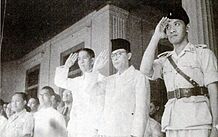
After Indonesia declared its independence on 17 August 1945, Sultan Hamengkubuwono IX quickly supported the new Republic. He became the lifelong Governor of Yogyakarta. Yogyakarta also became a Special Region.
The Dutch tried to take back their colony. Hamengkubuwono IX played a big part in fighting them. In 1946, Indonesia's capital moved to Yogyakarta. The Sultan gave money to the new government. When the Dutch attacked Yogyakarta in December 1948, the Sultan stayed. He refused to work with the Dutch.
The 1 March General Offensive
In 1949, Hamengkubuwono IX came up with a plan for a big attack on Yogyakarta. The goal was to show the world that Indonesia was still fighting. General Sudirman approved the idea. Lieutenant Colonel Suharto led the attack.
On 1 March 1949, at 6 AM, Suharto's troops launched the attack. It surprised the Dutch. Hamengkubuwono IX allowed his palace to be a hiding place for the soldiers. For six hours, Indonesian troops controlled Yogyakarta before retreating. This attack was a huge success. It gave hope to Indonesian soldiers everywhere.
On 30 June 1949, the Dutch left Yogyakarta and gave control to Hamengkubuwono IX. Indonesia gained full independence later that year.
Serving in the Government
After Indonesia became independent, Hamengkubuwono IX continued to serve the country. He remained Governor of Yogyakarta. He also held important roles in the Indonesian government.
He served as Minister of Defense and Vice Premier. He was also in charge of economic development. He helped fix Indonesia's economy.
Vice President of Indonesia
Becoming Vice President
The position of Vice President had been empty for a long time. In March 1973, Hamengkubuwono IX was chosen as Vice President. Suharto was re-elected as President.
His election was not a surprise because he was very popular. He was a civilian, which balanced Suharto's military background. As Vice President, he was in charge of welfare and economic development.
Stepping Down
People expected Suharto and Hamengkubuwono IX to serve another term together. However, Hamengkubuwono IX became unhappy with Suharto's leadership. He saw that Suharto was becoming too strict and that corruption was growing.
Students also protested against Suharto. In March 1978, Hamengkubuwono IX refused to be nominated for Vice President again. He said it was for health reasons. Suharto was upset by his decision.
Other Important Activities
Scout Movement Leader
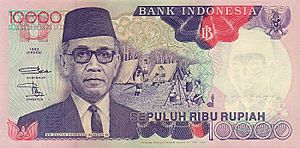
Hamengkubuwono IX was very active in the Scout movement. He supported it even when Indonesia was under Dutch rule. In 1968, he became the head of the national Scout movement. He received the Bronze Wolf award in 1973. This is a special award for great service to Scouting worldwide.
Sports Committee Chairman
He also cared about national sports. He helped create the National Sports Committee of Indonesia (KONI). He was its longest-serving chairman. Under his leadership, Indonesia achieved many proud moments in international sports.
Death
In 1988, Hamengkubuwono IX was visiting Washington D.C., USA. He suddenly became ill and passed away on 2 October 1988. His body was brought back to Yogyakarta. He was buried in the royal cemetery in Imogiri.
A special museum dedicated to him is in the Sultan's palace in Yogyakarta. He was also named a National Hero of Indonesia. This is a high honor for Indonesian patriots. His son, Raden Mas Herdjuno Darpito, became the next Sultan, taking the name Hamengkubuwono X.
When he passed away, a very old banyan tree in the palace square fell. Many Javanese people believed this showed the deep sadness of the kingdom itself.
Family Life
Hamengkubuwono IX had several wives and 21 children. His son, Hamengkubuwono X, became the next Sultan.
Personal Interests
Hamengkubuwono IX enjoyed watching Chinese Silat (martial arts) movies and reading novels. He also liked to cook. He even had an unofficial Silat club with some government ministers.
Honours
National Honours
 Star of the Republic of Indonesia, 2nd Class (20 May 1967)
Star of the Republic of Indonesia, 2nd Class (20 May 1967) Star of Mahaputera, 1st Class (20 May 1967)
Star of Mahaputera, 1st Class (20 May 1967) Guerrilla Star
Guerrilla Star
Foreign Honours
 Malaysia : Honorary Grand Commander of the Order of the Defender of the Realm (1974)
Malaysia : Honorary Grand Commander of the Order of the Defender of the Realm (1974) Germany: Grand Cross of the Order of Merit of the Federal Republic of Germany
Germany: Grand Cross of the Order of Merit of the Federal Republic of Germany Netherlands: Knight Grand Cross of the Order of the Netherlands Lion
Netherlands: Knight Grand Cross of the Order of the Netherlands Lion Thailand: Knight Grand Cross of the Most Exalted Order of the White Elephant
Thailand: Knight Grand Cross of the Most Exalted Order of the White Elephant Japan: Grand Cordon of the Order of the Rising Sun
Japan: Grand Cordon of the Order of the Rising Sun United Kingdom: Honorary Knight Grand Cross of the Order of St Michael and St George (1974)
United Kingdom: Honorary Knight Grand Cross of the Order of St Michael and St George (1974)
Images for kids
 | Frances Mary Albrier |
 | Whitney Young |
 | Muhammad Ali |


